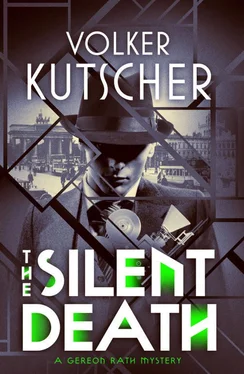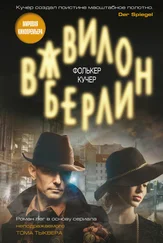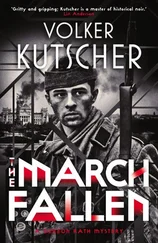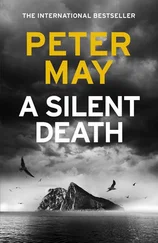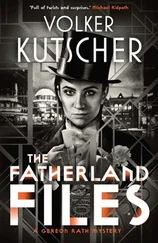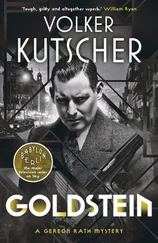‘I’m surprised,’ Fink said, ‘that there has been no news on the Winter case. Has it been confirmed as sabotage? Your colleagues have been pretty tight-lipped. I was referred to Inspector Böhm, but all he did was shout at me.’
‘ Chief inspector,’ Rath corrected, wiping up the last remains of soup with half a bread roll.
‘He’s the one leading the investigation?’
‘There’s always someone in charge,’ Rath said, ‘it’s the others who do the work.’
‘I knew I was talking to the right man.’ Fink seemed genuinely pleased. ‘You’ve issued a warrant. Does that mean you know who the murderer is?’
‘Let’s not rush to condemn. We’re looking for an important witness. I can tell you one thing for sure: Betty Winter’s death was no accident. Anything else would be speculation, and I’d sooner leave that to you.’
‘I’d sooner have facts.’
‘I’m afraid there’s nothing new.’
‘Does Betty’s death have anything to do with the script in your hand?’ Fink pointed to the screenplay. ‘ Liebesgewitter . That’s the name of her final film, isn’t it? Does it contain the key to her murder?’
‘Just routine.’ It was the only cliché Rath could think of.
Fink looked Rath in the eye a moment too long and a shade too aggressively, before standing up. ‘You have my card,’ he said. ‘Call me when you know more. You won’t regret it.’
Rath had heard that phrase suspiciously often recently, and couldn’t help thinking that someday he just might. He pocketed the card, even though he knew he wouldn’t be calling Stefan Fink.
The clock in the dark, smoky restaurant showed shortly before one. Rath lit a cigarette and ordered a coffee. Now all he needed was a typewriter. It was too loud in Aschinger, so he gathered a few coins once he had finished his coffee and started looking for a public telephone. He found one on Dönhoffplatz, just next to Tietz. He knew the number of his old digs by heart. The operator put him through.
‘Behnke,’ a woman’s voice said.
‘Herr Weinert, please,’ said Rath.
‘Who’s there, please?’
‘A friend of Herr Weinert’s.’
There was a click, and Rath could just see the receiver being placed on the little telephone table. He wondered if Elisabeth Behnke had recognised his voice, but it didn’t matter. The main thing was that she fetched Weinert to the telephone.
The journalist came on the line with a careful ‘Yes?’
‘Gereon here.’
‘Oh, so it’s you who’s acting so mysteriously. I might have known. Old Behnke’s dying of curiosity. I told her something about anonymous sources.’
‘That’s kind of true. At least sometimes.’
‘Have you got something then? I could use a big story, preferably an exclusive. The rent’s already due.’
‘I’ll see what I can do.’
‘Aren’t you on this Betty Winter story? That would be something.’
‘Are you interested in that?’
‘I’m interested in anything people are talking about.’
‘I don’t have much for you. Actually, I’m calling about something else.’
‘Do you want to move back in?’
‘ Nit f ö r Kooche.’
‘Pardon me?’
‘That was Cologne dialect. Not if you paid me.’ Before Rath could continue, a heavy CLICK-CLACK by his ear made him start. Someone was pounding on the glass pane, not Böhm, not Brenner, but a woman. A grim-looking Fury, who might, perhaps, have been young and beautiful during the Kaiser’s reign, was banging on the cabin glass with the point of her umbrella, gesturing to the sign above the telephone that stated unequivocally: Keep it brief, be considerate of those waiting. Rath gave the dragon a nod and a placatory wave of the hand.
‘Gereon?’
‘Let me cut to the chase: I need your typewriter.’
‘Is there anything of mine you don’t want? I need that typewriter for work. Without it, I’ll starve.’
‘I don’t want to buy it. Just to borrow it for a day.’
‘When?’
‘Today.’
‘Don’t you have any typewriters at Alex? Or have you been barred from the station?’
‘Something like that.’
Weinert considered for a moment. ‘I’ll make a suggestion,’ he said finally. ‘My typewriter for your car.’
He could manage without the Buick for the rest of the day. True, he had been intending to drive out to Westhafen to visit the Ford plant, but that could wait so long as they hadn’t sent him the list of names from Cologne. Outside, the woman knocked on the glass once more. ‘OK,’ he said, ‘but I need it back early tomorrow morning.’
‘Wonderful! Then at least I’ve got a security against the typewriter.’
‘I’ll pick you up at Wittenbergplatz.’
‘And I’m supposed to just tuck the typewriter under my arm, am I?’
‘It’s only one station with the train.’
Weinert laughed. ‘Might be better anyway. Old Behnke’s in such a good mood at the moment. I don’t want to jeopardise that by your coming here.’
The dragon knocked again. He hung up before opening the door with a jolt and showing the woman his badge. ‘Do you know what it means to obstruct a criminal investigation?’ he shouted, without warning. ‘I could take you down to the station!’
She gave a start. ‘But officer! I had no way of knowing. If you need to make another call, please go ahead.’
Rath made a serious face and said: ‘Fine, let’s leave it at that. But in future, you should treat the work of police with a little more respect.’
‘Of course! Of course!’ The woman clasped her umbrella and handbag to her breast and made an immediate about-turn, no doubt glad to have narrowly escaped arrest.
Weinert was on time. Standing outside the underground station at Wittenbergplatz, he was difficult to miss despite the crowd, since he was the only one with a typewriter under his arm. The passers-by were unperturbed. Sometimes Rath thought that a five-legged, three-metre giant strolling across Tauentzienstrasse would elicit nothing more than a slightly raised eyebrow from a seasoned Berliner – provided, of course, that he was moving quickly enough. The only type of person who made an immediately negative impression on Berliners in the mad rush of their city was the astonished provincial, pausing to gawp at something and constantly running the risk of being steamrolled. The city showed its new arrivals no mercy, that much Rath had experienced himself; either they were consumed and ingested by the great organism within a matter of weeks, or they were spewed out.
He turned onto Tauentzienstrasse, paused at the red light at KaDeWe and tooted. At least a dozen people turned to look before Weinert recognised the car and started towards it. No sooner had he settled into the passenger seat than Rath stepped on the gas.
‘Hello, my precious,’ Weinert said, stroking the dashboard. ‘I hope he’s treating you well.’
‘If I’d known I’d be tearing a relationship apart…’
‘If you knew how many tears I’ve cried.’
‘You seem to be more faithful to cars than women.’
‘Could be.’ Weinert shrugged his shoulders. ‘On the other hand: I’ve never sold a woman.’
Rath wore a dutiful, slightly wry grin. ‘Do you regret it?’ he asked. ‘I thought I’d done you a favour.’
A few weeks before Christmas Weinert had lost a lot of money on the stock market, and his position as editor shortly afterwards. Rath had given himself the car as a Christmas present, in so doing helping his friend, who urgently needed cash, out of a jam. It had also enabled him to spend a portion of the five thousand marks he had found in his mailbox one late summer’s day.
Читать дальше
